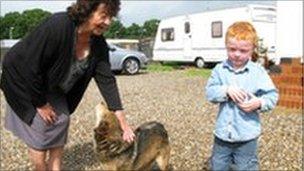Uncertain times for travellers and gypsies
- Published
Mike Lanchin visits some of the residents of Dale Farm in Essex
A traveller all her life, 69-year-old Mary Ann McCarthy is proud to show visitors around the place she calls home.
"It used to be a dirty scrapyard, but we cleaned it up. Each family has their own deeds," the grey-haired grandmother said, as we strolled through the sprawling site of caravans and mobile homes at Dale Farm, on the outskirts of Basildon, Essex.
"The government at the time said let gypsies and travellers provide for themselves and so we did," she added.
But for eight years Mrs McCarthy and her neighbours at Dale Farm, part of which is designated green belt land, have faced the threat of eviction by Basildon District Council. Their final legal challenge was lost in the House of Lords in May last year.
And now with the new coalition government making changes to the way local authorities are required to deal with gypsies and travellers, Mrs McCarthy and her neighbours are again wondering if their time is up.
"All we want is to be left alone, they can have this land, but they can't just throw us onto the side of the road, with nowhere to go," she said mournfully.
Friction
Owned by Gypsies and Irish travellers, some of whom have been living there since the 1970s, Dale Farm is one of the largest sites in England.
Though many of its residents come and go, especially during the long summer months, there is a certain feel of permanence to the place.
Electric lighting lines the roads between the rows of mobile homes, most of which have running hot and cold water and gas cookers. In another part of the country they could well be mistaken for holiday homes.
With many parents settling down at the site in recent years, the children have been able to go to the local school, in nearby Crays Hill. That may change if they are evicted, said Mrs McCarthy.
According to other residents I spoke to, all but a few of the non-traveller pupils were pulled out of the school soon after the travellers' offspring became the majority.
"The local people who know us get, we get on very well with," Mrs McCarthy said. "But there are lots that don't," she added.

Under Labour, local councils were given around £150m over five years to spend on building new sites
Many of those I approached in Crays Hill, a quiet place dominated by a large village green, with a pub, a garage and a local convenience store, were unwilling to talk openly about their feeling towards the Dale Farm residents.
The owner of one shop told me it was not worth my time trying. One shopper, however, complained that the travellers "did not pay council taxes... (and) should leave." Another woman was more outspoken - and rude.
According to Chris Myant, of the Commission for Equality and Human Rights - a quango that monitors public policy towards gypsies and travellers - the past decade has seen better intentions from government.
Under Labour, local councils were given around £150m over five years to spend on building new sites for those occupying land illegally, like the Dale Farm residents.
There was also a recognition of the gypsy and traveller community's right to be housed.
But, said Mr Myant, at the end of the decade, "there were as many people living on the roadside as at the beginning."
In fact, around a fifth of travellers and residents in England are still living on illegal land.
'Leadership needed'
Since taking office in May, the coalition government has moved to scrap Labour's targets, change the way in which money is allocated and remove regional supervision and co-ordination of the planning of new sites.
Cllr Tony Ball, leader of the Conservative-controlled Basildon District Council - which has spent more than £1m in legal costs to clear Dale Farm - welcomed the changes, but with some reservations.
He said: "Through the scrapping of targets we don't now have to find extra provision for gypsies and travellers; but it also means that other local authorities don't have a responsibility to find sites."
Others are concerned, however, that freeing-up councils from central government pressures - and stripping them of funds at a time of public sector cuts - could lead to vocal residents opposed to the gypsy and travellers - such as those I met near Dale Farm - gaining greater influence over local politicians.
For Mr Myant, the coalition needs to give "leadership from the top," sending the message to local communities that "we can live together".
Among proposals believed to be currently under discussion - and due to be unveiled in the Autumn - Eric Pickles, the communities and local government minister, is considering increasing local say in planning decisions as well as halting retrospective planning permission for gypsies and travellers.
- Published24 August 2010